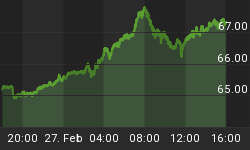Since the release of the Fed Open Market Committee statement yesterday, much has been said about the Fed's newfound commitment to contain inflation. However, currency traders have apparently confused the Fed's mere mention of the word "inflation" with an actual intention to do something about it.
Presuming that a tougher Fed means higher interest rates, traders have aggressively bought dollars. However, this conclusion ignores the facts that higher interest rates will ultimately: 1) precipitate a severe recession, 2) exacerbate both the current account and budget deficits, 3) collapse the housing, stock, and bond market bubbles, 4) cause millions to lose their jobs, 5) bankrupt millions of consumers, and thousands of companies and hedge funds, 6) result in capital flight out of the United States 7) and not even rise high enough to exceed the rate of inflation, leaving real yields negative. Therefore, higher interest rates will actually weaken, rather than strengthen, the dollar. Currency traders betting on the reverse be warned.
The Fed is attempting to do with words what it is incapable of doing with deeds. It has neither the means, nor the desire, to combat inflation, which is its own creation. By denying that inflation exists, and pretending to be concerned if it were to emerge, the Fed is able to fool America's creditors, buy life support for the U.S. bubble economy, and postpone the inevitable day of reckoning.
Let me elaborate on the points I mentioned earlier:
1) Precipitate a recession - As they will result in the cost of adjustable rate mortgages and other floating rate debt to rise, higher interest rates will crush consumer spending and result in greater shares of household incomes going to debt service. Consumer spending is 80% of U.S. GDP.
2) Exacerbate America's "Twin Deficits" - Due to the short-term nature of Americas outstanding debt instruments, higher interest rates will increase both the budget and current account deficits, as higher interest payments are required to service maturing debts. Also, the recession itself will add to the deficit, resulting in even more borrowing at even higher interest rates.
3) Collapse the housing, stock, and bond market bubbles - Asset bubbles depend on low interest rates and continued speculation to sustain their inflated prices. When the bubbles burst, the shockwaves will reverberate throughout the entire economy. Individual household net worth's will be turned upside down, with reverse-wealth effects restraining consumption for years to come. The entire financial system will be at risk, as asset prices fall too low to secure the debts they currently collateralize. In addition, as the cost of servicing those debts grows, an increasing amount will default, exerting further downward pressure on prices.
4) Cause millions to lose their jobs - Since the majority of American workers depend on the discretionary spending of other Americans, millions will be unemployed. Especially hard hit will be mortgage and consumer finance, home building, real estate sales, financial services, travel, entertainment, and retailing. In other words, just about every American.
5) Bankruptcy of millions of consumers, and thousands of companies and hedge funds - As the cost of servicing floating rate, short-term debt rises, debts will be increasingly more burdensome to service. Consumers have borrowed heavily with ARM's to buy residential real estate at inflated prices, corporations have financed long-term capital investments and share buy-backs with short-term debts, and hedge funds have leveraged heavily using short-term financing to buy long term bonds. If you thought the 1998 blow up of Long Term Capital Management was bad, multiply it by 1,000.
6) Capital flight out of the U.S. - Recession, unemployment, collapsing assets prices, and waves of bankruptcies and foreclosures, will cause capital, both foreign and domestic, to flee. This will put additional upward press on interest rates and downward pressure on the dollar.
7) Real yields still negative - Despite the fact that interest rates will be rising sharply, inflation will be accelerating even faster. Therefore real interest rates are likely to fall even as nominal rates soar. This will likely weigh heavily on the dollar.
In the final analysis, higher interest rates, especially when they result from inflation rather than growth, will likely be the straw that breaks the back of the over-leveraged American economy. As the world's largest debtor nation struggles to make higher interest payments on its massive external liabilities, those holding its IOU's will finally come to their senses. Realizing that the burden will ultimate proof too great, they will attempt to sell. Unfortunately, this realization will likely come too late, as few will be willing to take the other side of the trade.















